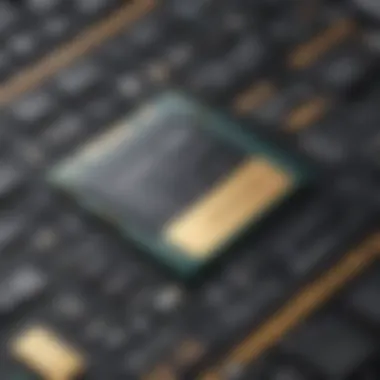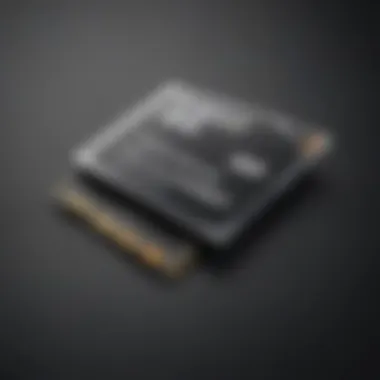Unraveling the Intricacies of CF Memory Cards: A Comprehensive Exploration


Understanding Storage, Security, or Networking Concepts
As we embark on this in-depth exploration of CF memory cards, it is paramount to first establish a solid foundation in storage technology. Storage devices are vital components in the digital realm, encompassing a diverse range of solutions for preserving and accessing data. Understanding the fundamental concepts of storage is key to grasping the significance of CF memory cards within this landscape. Terms like readwrite speed, capacity, and compatibility will be elucidated to provide a clear framework for delving into the intricacies of CF cards.
Introduction to CF Memory Cards
In the realm of modern technology, understanding CF memory cards holds paramount importance. These compact storage devices play a crucial role in various electronic devices, ranging from professional cameras to industrial equipment. Exploring CF memory cards is akin to unraveling the backbone of digital storage solutions. Through this article, readers will journey through the intricate details of CF memory cards, grasping their significance and impact on contemporary technology.
Understanding the Basics
Definition of CF Memory Cards
Delving into the definition of CF memory cards unveils a fundamental aspect of these storage devices. Compact Flash (CF) cards are robust, compact flash memory cards utilized primarily for storing data in electronic devices. Their resilience and adaptability have made them a preferred choice in numerous industries. The key characteristic of CF memory cards lies in their ability to combine durability with high storage capacity, catering to the diverse needs of users. This unique feature sets CF cards apart, making them a reliable option for professionals and enthusiasts seeking dependable storage solutions.
Evolution of CF Technology
The evolution of CF technology signifies the progression of storage solutions in the digital landscape. Over the years, CF cards have undergone significant advancements, enhancing their speed, capacity, and compatibility. This evolution has paved the way for more efficient data storage and transfer, revolutionizing the way information is stored and accessed. The key characteristic of this evolution is the seamless integration of cutting-edge technologies to optimize performance and reliability. Embracing these advancements has positioned CF cards as versatile and indispensable components in various electronic devices.
Key Characteristics
Exploring the key characteristics of CF memory cards sheds light on their unique attributes. CF cards boast features such as robust construction, high data transfer speeds, and broad device compatibility. These characteristics make CF cards resilient in challenging environments, ensuring data integrity and longevity. The distinctive feature of CF cards lies in their adaptability to diverse devices without compromising performance. This quality enhances the usability and efficiency of CF cards across a wide range of applications, making them an essential tool for data storage and transfer.
Types of CF Memory Cards
CompactFlash Type
Compact Flash Type I cards represent a standard format in the CF card family, known for their compact size and reliable performance. These cards feature a slim design, making them ideal for devices with limited space. The key characteristic of Type I cards is their compatibility with a wide range of devices, from digital cameras to gaming consoles. Their unique feature lies in their versatility, allowing users to leverage them in various settings without sacrificing speed or capacity.
CompactFlash Type


Compact Flash Type II cards offer enhanced storage capacity and faster data transfer speeds compared to Type I cards. These cards are popular among professional photographers and videographers who require high-performance storage solutions for their multimedia projects. The key characteristic of Type II cards is their robust construction and resilience to withstand rigorous usage. Their unique feature lies in their ability to support larger file sizes and handle demanding applications with ease.
CompactFlash Type
Compact Flash Type III cards are designed for specialized applications that demand superior performance and reliability. These cards often feature advanced technologies to meet the requirements of industrial and commercial sectors. The key characteristic of Type III cards is their robustness and durability, making them suitable for rugged environments. Their unique feature lies in their high storage capacities and data transfer speeds, enhancing efficiency and productivity in demanding scenarios.
Advantages of CF Memory Cards
Durability and Reliability
The durability and reliability of CF memory cards set them apart from traditional storage solutions. These cards are built to withstand extreme conditions, including temperature fluctuations and physical damage. The key characteristic of CF cards in terms of durability and reliability is their ability to retain data integrity even in harsh environments. Their unique feature lies in their longevity and resistance to data corruption, ensuring consistent performance over time.
Fast Data Transfer Speeds
CF memory cards excel in providing fast data transfer speeds, facilitating quick access to stored information. The key characteristic of CF cards in terms of speed is their efficiency in transferring large files without latency or delays. Their unique feature lies in their high read and write speeds, reducing waiting times and optimizing workflow efficiency. This advantage makes CF cards a preferred choice for professionals working with high-resolution images and videos.
Compatibility Across Devices
CF memory cards offer broad compatibility across a wide range of devices, making them versatile and convenient storage solutions. These cards seamlessly integrate with various electronic devices, such as cameras, camcorders, and music players. The key characteristic of CF cards in terms of compatibility is their ability to function across multiple platforms without requiring additional adapters or modifications. Their unique feature lies in their plug-and-play functionality, enabling effortless data transfer and storage management across different gadgets.
Features and Specifications
In the realm of CF memory cards, understanding the features and specifications becomes paramount. These elements serve as the backbone of these storage devices, dictating their performance and compatibility across various devices. When delving into the features and specifications of CF memory cards, one must pay close attention to details such as storage capacities, speed class ratings, and form factors.
Storage Capacities
Range of Capacities Available
When considering CF memory cards, the range of storage capacities available plays a pivotal role. These cards come in a variety of capacities, ranging from a few gigabytes to terabytes, catering to different user needs. The key characteristic of this feature lies in providing users with flexibility and options to choose based on their requirements. For instance, professional photographers might opt for higher capacities to store large RAW image files, while casual users may suffice with smaller capacities for everyday use. The unique feature of a diverse range of storage capacities is the ability to adapt to varying storage needs, making CF memory cards a versatile choice in the realm of technology.
Considerations for Choosing the Right Capacity


Selecting the right capacity for a CF memory card involves careful considerations. Factors such as the type of data to be stored, frequency of usage, and compatibility with devices should all be taken into account. The key characteristic here is matching the capacity to the intended use to avoid overpaying for excess storage or facing limitations due to insufficient space. One of the unique features of considering the right capacity is optimizing cost-efficiency and usability. By evaluating one's storage requirements, users can make informed decisions that align with their specific needs.
Speed Class Ratings
Understanding Speed Classes
Speed class ratings are critical in determining the data transfer speed of CF memory cards. These ratings indicate the minimum write speed of the card, enabling users to capture high-resolution images or videos seamlessly. The key characteristic of speed classes is ensuring smooth and efficient data transfer, especially when working with large files. The unique feature of understanding speed classes lies in optimizing performance based on the demands of the task at hand. By selecting a card with an appropriate speed class rating, users can enhance workflow efficiency and productivity.
Impact on Performance
The impact of speed class ratings on performance cannot be overstated. A higher speed class rating translates to faster read and write speeds, facilitating quicker data access and improving overall device performance. The key characteristic here is the direct correlation between speed class ratings and user experience, particularly in activities that require rapid data exchange. The unique feature of this impact is the ability to harness the full capabilities of CF memory cards, resulting in enhanced operational efficiency and task completion.
Form Factors
Physical Sizes of CF Cards
The physical sizes of CF cards serve as a fundamental aspect of their design. These cards come in different form factors, such as Type I and Type II, each with distinct dimensions to suit various devices. The key characteristic lies in the compatibility offered by different form factors, allowing CF cards to be used across a wide range of devices seamlessly. The unique feature of physical sizes is the adaptability to diverse hardware configurations, ensuring versatility and ease of use.
Compatibility with Different Devices
Ensuring compatibility with different devices is crucial when selecting CF memory cards. The ability of these cards to work seamlessly with various cameras, camcorders, and other electronic devices is a key consideration. The key characteristic of compatibility lies in the universal nature of CF cards, eliminating concerns about connectivity issues or device restrictions. The unique feature of compatibility with different devices is the convenience it offers to users, allowing them to interchange CF memory cards between different gadgets without any hassle.
Common Applications
CF memory cards are versatile storage devices extensively used across a multitude of applications due to their reliability and performance. The adaptability of CF memory cards makes them essential tools in various fields such as photography, videography, industrial systems, and gaming consoles. Understanding the common applications of CF memory cards sheds light on their wide-ranging utility in different industries.
Photography and Videography
Professional Cameras: Professional cameras rely on CF memory cards for their robust storage capabilities, ensuring efficient data handling during high-resolution image and video capture. The reliability and fast data transfer speeds of CF cards make them a preferred choice for professional photographers and videographers, enhancing workflow efficiency and reducing potential data loss risks. The compatibility of CF cards with high-end camera systems further solidifies their position as a crucial component in the photography and videography domain.


Camcorders and Action Cameras: CF memory cards are integral to camcorders and action cameras, offering ample storage space for continuous video recording and swift data retrieval. The durability of CF cards suits the dynamic nature of action-packed filming, providing a stable storage medium for capturing fast-paced sequences with minimal lag or buffering issues. The compact size and reliable performance of CF cards make them ideal for use in camcorders and action cameras, ensuring seamless recording experiences in various settings.
Industrial and Embedded Systems
Automation Equipment: CF memory cards play a vital role in automation equipment by storing critical system data and facilitating seamless operation in industrial settings. The rugged design and high-speed data transfer of CF cards ensure reliable performance in demanding environments, enhancing the efficiency and stability of automated processes. The compatibility of CF cards with a wide range of automation devices underscores their significance in optimizing industrial operations and improving overall productivity.
Medical Devices: In the healthcare sector, CF memory cards are commonly integrated into medical devices for secure data storage and efficient information management. The stable performance and compatibility of CF cards with medical equipment streamline data recording and retrieval processes, supporting accurate diagnostics and patient care. The compact form factor and data integrity features of CF cards make them a trustworthy choice for storing critical medical information while maintaining data security and privacy.
Gaming Consoles and Music Players
Usage in Game Systems: Gaming consoles leverage CF memory cards to store game data, downloadable content, and software updates, ensuring smooth gameplay experiences without compromising storage capacity. The fast read and write speeds of CF cards enhance loading times and system responsiveness in gaming environments, providing gamers with efficient access to their favorite titles and downloadable content. The versatility and reliability of CF cards make them valuable assets in gaming consoles, contributing to an enhanced gaming experience for users.
Audio Recording Devices: CF memory cards are widely used in audio recording devices for capturing high-quality audio recordings with minimal latency and enhanced storage capacity. The stable performance and durability of CF cards support uninterrupted recording sessions, preserving audio data integrity and minimizing the risk of data loss. The compact size and compatibility of CF cards with various audio devices make them a preferred choice for content creators, musicians, and professionals seeking reliable storage solutions for their audio recording needs.
Future Trends and Innovations:
In this particular section, we delve into the critical aspect of future trends and innovations concerning CF memory cards. It is imperative to stay abreast of the advancements in technology to comprehend the trajectory of CF memory cards in the evolving landscape of storage devices. By exploring the potential developments in CF technology, we can anticipate the impact on various sectors utilizing these cards.
CFexpress Technology:
Introduction to CFexpress:
The introduction of CFexpress marks a significant leap in the realm of memory card technology. This innovative technology offers unparalleled speeds and capacities, catering to the demanding requirements of modern devices. The key characteristic of CFexpress lies in its lightning-fast data transfer rates, significantly trumping traditional CF cards in performance metrics. The unique feature of CFexpress is its compatibility with next-generation devices, ensuring seamless integration and efficiency.
Enhancements Over Traditional CF Cards:
The enhancements brought about by CFexpress over traditional CF cards are revolutionary. With enhanced read and write speeds, CFexpress accelerates data-intensive tasks, making it a preferred choice for professionals reliant on swift and reliable storage solutions. The key characteristic of CFexpress lies in its efficiency in handling large file sizes without compromising speed or performance. Its distinct advantage over traditional CF cards lies in its optimal performance even in the most demanding scenarios, elevating user experience and productivity.
Impact of CF Memory Cards on Emerging Technologies:
Internet of Things (Io T):
Within the realm of emerging technologies, CF memory cards play a pivotal role in the Internet of Things (Io T) ecosystem. The key characteristic of CF cards in IoT applications lies in their robustness and reliability, crucial for continuous data logging and processing in interconnected devices. CF cards provide a secure and stable storage solution for IoT devices, ensuring data integrity and system functionality. One unique feature of utilizing CF cards in IoT is their seamless compatibility across a multitude of IoT devices, facilitating streamlined data management and operation.
Artificial Intelligence (AI) Applications:
In the domain of Artificial Intelligence (AI) applications, CF memory cards serve as a cornerstone for data storage and retrieval processes. The key characteristic of CF cards in AI applications is their swift data access speeds and high-capacity storage capabilities, essential for handling vast datasets in AI algorithms. CF cards offer a reliable and efficient storage solution for AI systems, enabling quick access to training data and optimized model performance. One notable advantage of employing CF cards in AI applications is their resilience to intensive read and write operations, ensuring sustainable AI processing without compromise.



